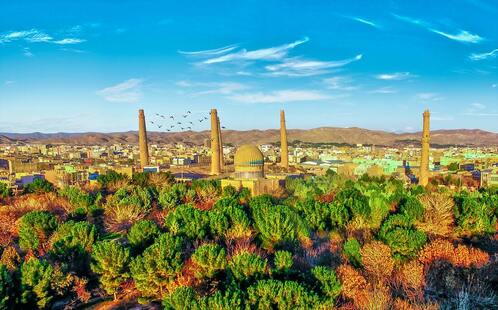|
By Anya Shukla At some point in her life, every girl makes a list of the top ten reasons that she dislikes men. #1 on mine? The way most of them act in this book. (#2 is their ridicule of my beloved romance novels. Guess what, dude? I’m learning about healthy relationships, so you can just sit at home and cry because no one will go out with you.) Several times during this memoir, I wanted to scream and/or punch something. If you are a woman, or you care about women, I hope you do the same. Review: Exiled from Afghanistan and divorced from her husband, Homiera Qaderi lives 7,500 miles away from her son… who has been told that his mother is dead. Qaderi’s remedy to this heartbreaking separation comes through “Dancing in the Mosque: An Afghan Mother’s Letter to Her Son.” The memoir consists of a collection of vignettes about her life, interspersed with short letters to her son. Qaderi details her childhood under the Soviet-Afghan War—including the devastation wrought by bombings and fighting—and describes living under the Taliban-issued oppressive restrictions for women. Her unapologetic feminist advocacy is a throughline throughout the book; she holds Afghan men—and mainstream Afghan cultural beliefs—accountable for the ways they have tyrannized women. Rating: 4/5. What I Loved: The way “Dancing in the Mosque” showcases Afghanistan’s multidimensionality. Contrary to popular belief, not all Afghan men are antifeminist. When Qaderi, who is already teaching girls in her neighborhood to read, asks to expand her classes to nearby refugee children, her father helps her do so by carrying a blackboard past a Taliban checkpoint two times a day. Both her parents encourage female literacy, even when mainstream Afghanistan doesn’t. Best of all, Qaderi is incredibly brave. She risks injury or death to teach children how to read, travel on the streets alone, publish her writing in the city newspaper, and start a protest at the capital. In America, I feel like we have a perception of Afghan women as demure and meek. Yet many, like Qaderi, are trying to break free of oppressive cultural and social norms to the best of their abilities. At the same time, Qaderi’s experience is simultaneously aggravating and painful. She saw death so often growing up that she describes it matter-of-factly: “Zahra was seventeen when she was struck by one of those invisible bullets while she was trying to pull me out of the grapevine and carry me to safety in the basement” (pg. 20). Beyond the near-constant fighting and war, Qaderi also faces the erasure of her rights as a woman: “When a commander signaled to his men that there was a girl he wanted, they knew they were to go and get her. The system had been the same under the communists and during the civil war. Girls had no say in whom they wanted and it didn’t matter who they were, what they thought, or how they looked: it was enough that they were female and had reached puberty” (pg. 261). Mainstream Afghan society views women as property or objects, not full-fledged human beings; they have worth only in relation to men: ““In Afghanistan, a good woman was defined as a good mother” (pg. 291). I’m glad that this book gave me greater insight into the lives of Afghan women, but it also made me SO MAD. What I Didn’t Love: “Dancing in the Mosque” reads as a traditional memoir, which isn’t necessarily a bad thing. I just prefer my books to be a tiny bit more... convoluted/complicated. Qaderi’s writing style tends towards simplicity: she describes exactly what happened instead of forcing the reader to determine the situation’s outcome based on metaphors and half-truths. Totally personal preference, though. After all, this book’s power doesn’t come from its reimagining of the memoir form but the stories Qaderi tells about her life in Afghanistan. Food for Thought: In her adolescence, Qaderi meets a boy who joined the Taliban yet hates war. When she asks him why he pursues a life of destruction, he responds, “So, in your mind, we were born to destroy? Have you ever seen our green pastures? Once, we had prosperous fields. But in the war… everything was burned. It was turned to smoke and ash” (pg. 198). The war destroyed his family’s livelihood, leading him to join the Taliban. In the 1990s, the Taliban, who controlled the opium industry, had the economic power amidst drought and widespread poverty to “purchase weapons, pay their troops, and enforce sharia law” (pg. 130). Those resources drew recruits who might not fully believe in their orthodox ideals but lacked the financial means to survive elsewhere. How can we prevent this from happening? Was it even possible to infuse Afghanistan with economic capital and rebuild the country after the Soviet-Afghan War so that joining the Taliban wasn’t someone’s only recourse? Is that ever going to be possible now, after more than 20 years of war and the Taliban’s new control over Afghanistan in 2021? This seems especially relevant given the context of climate change. As the world heats up, drought and famine will become more widespread. We could see greater political destabilization; people might turn to groups, like the Taliban, who subjugate others but promise economic stability. A Quote I Would Like On Goodreads Because It Captures The Insidious Nature of Antifeminism: “It takes years and generations for men to accept strong women. And in the end, he felt more accountable to society than me” (pg. 307). Next up: "Moth Smoke" by Mohsin Hamid.
0 Comments
Your comment will be posted after it is approved.
Leave a Reply. |
Archives
February 2023
Categories
All
|

 RSS Feed
RSS Feed